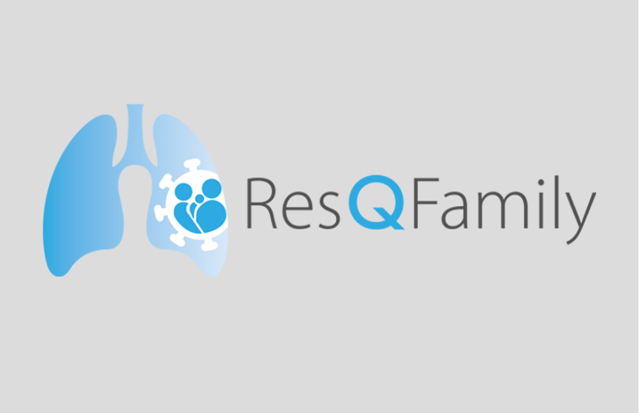
ResQ Family is an international research project led by the Global Foundation for the Care of Newborn Infants (GFCNI) investigating how hospitalizations due to Respiratory Syncytial Virus (RSV) impact the quality of life of infants and their families. The study provides critical evidence to raise awareness, improve support systems, and promote preventive measures to reduce the burden of RSV on families across Europe.
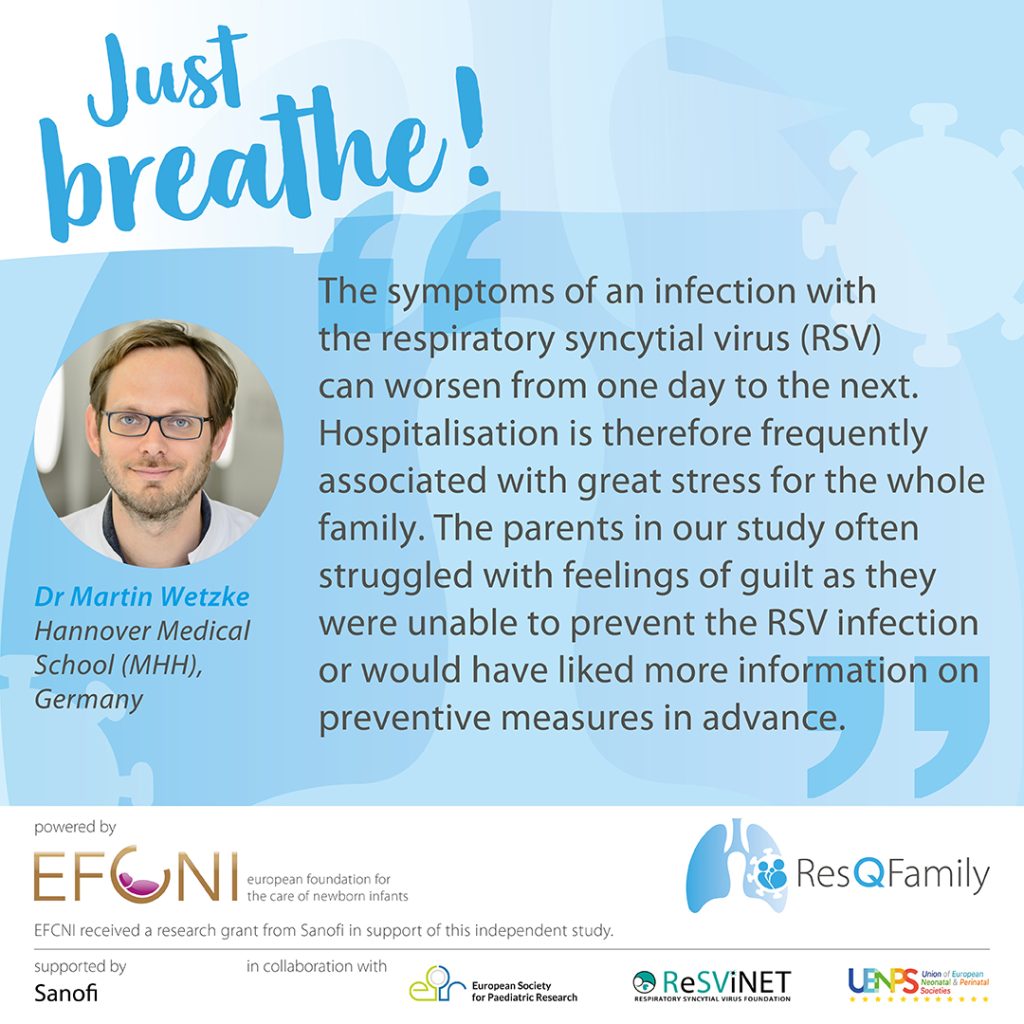
Respiratory Syncytial Virus (RSV) is a highly contagious virus and the leading cause of pediatric bronchiolitis and pneumonia – both forms of lower respiratory tract infections (LRTIs). Nearly all children will contract RSV at least once by the age of two. Globally, RSV is a major driver of hospitalizations among infants, with an estimated 33 million cases of acute LRTIs resulting in more than 3 million hospital admissions annually in children under five years old.
While most RSV infections are mild, the course of the disease is unpredictable, and some infants may develop severe symptoms requiring hospitalization. In serious cases, RSV can lead to intensive care unit (ICU) admissions, mechanical ventilation, and potential long-term complications such as recurrent wheezing, asthma, and reduced lung function.
Beyond the medical effects, RSV-related hospitalizations place a significant emotional and financial burden on families. Parents often face heightened stress, disruptions in family functioning, and loss of work productivity during and after their child’s illness.
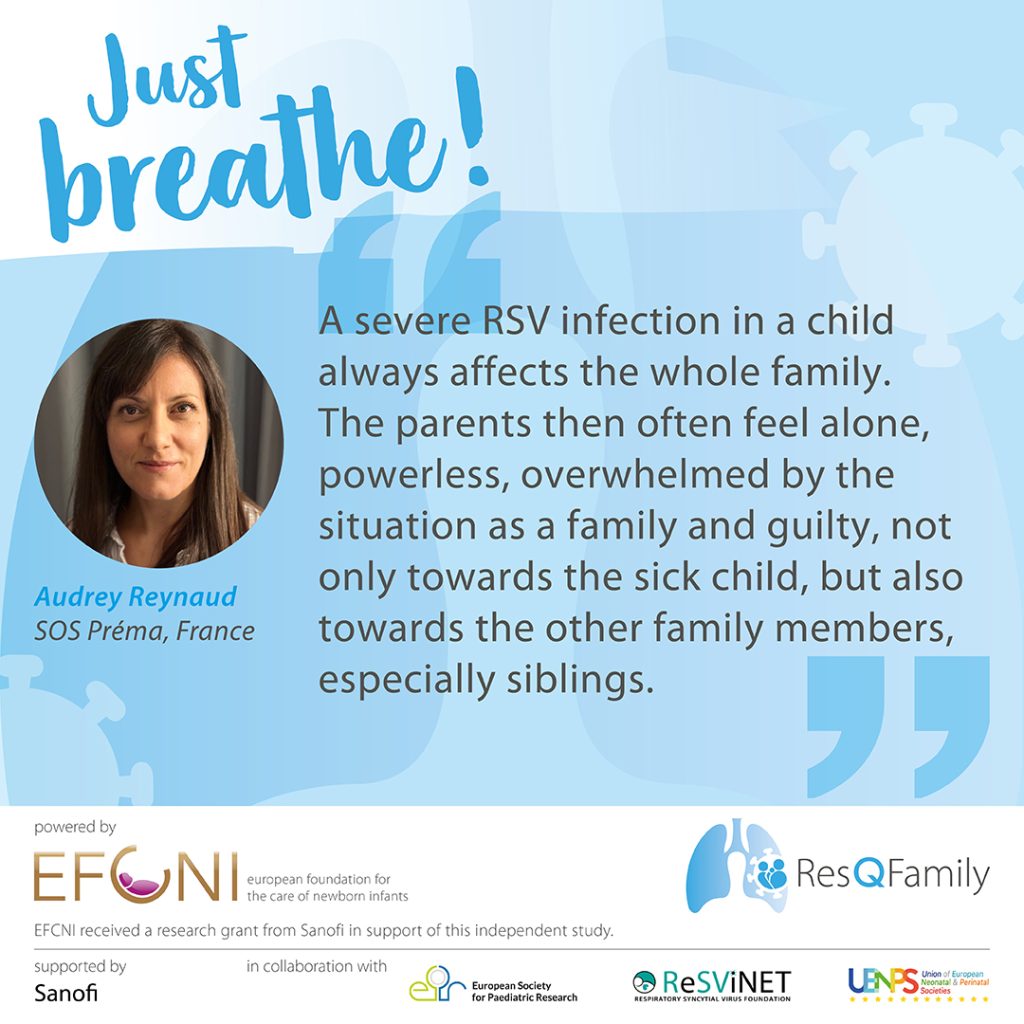
Despite RSV’s widespread impact, there is limited research on how RSV hospitalizations affect family quality of life. The ResQ Family project addresses this gap by surveying parents and caregivers of children up to 24 months old who had recently been hospitalized due to RSV.
Using an online questionnaire, the project collected responses from families whose infants were hospitalized for at least 12 hours, with the admission occurring no more than four weeks before the survey date. The goal is to assess the impact of RSV on:
Children’s health-related quality of life
Family wellbeing and mental health
Daily functioning and work productivity
The project also aims to provide scientific evidence on the overall burden of RSV and to raise awareness among healthcare professionals, patient advocates, policymakers, and the general public.
Data collection took place during the RSV season from autumn 2022 to spring 2023 in four European countries: France, Germany, Italy, and Sweden. The ResQ Family project runs until June 2024.
Survey responses from participating families reveal a significant impact on family life, especially during the acute phase of the RSV infection. Parents across all four countries reported:
High levels of stress and anxiety
Disruptions to family routines
Challenges balancing work responsibilities
A drastic decline in overall health-related quality of life
Additionally, the findings identified potential stressors and country-specific gaps that should be addressed to reduce the burden on affected families in the future.
Explore the findings of the ResQ Family study through insightful expert videos and concise motion graphics, providing a comprehensive view of how families across countries have been impacted by their child's hospitalization due to RSV.
This concise motion graphic video, available in five languages (English, French, German, Italian, Swedish), summarizes critical ResQ Family study results related to the family burden. It emphasizes parents' emotional distress during hospitalization, impacts on the family's personal and professional life, disease awareness, and the quality of support from healthcare providers.
For detailed key and country-specific findings, please refer to the project report.
The Global Foundation for the Care of Newborn Infants (GFCNI) leads the ResQ Family project in close collaboration with international experts, scientific advisors, and parent representatives. Local and international partners across participating countries also support the project.
GFCNI Team Members:
For more information about the project, please contact: research(at)efcni.org
The External Scientific Advisory Board (ESAB) supports the ResQ Family project with expert guidance on study design, data interpretation, and scientific quality.
ESAB Members:
The Project Expert Group (PEG) consists of leading clinicians, researchers, and parent advocates in the fields of pediatrics, neonatology, infectious diseases, and family support. Their contributions ensure that the project reflects both scientific rigor and real-world family needs.
PEG Members:
Explore the scientific publications that highlight the methodology and findings of the ResQ Family study. These resources provide valuable insights into the impact of RSV-related hospitalizations on infants and their families across Europe.

To understand the scientific foundation of the project, we invite you to review the ResQ Family Study Protocol. This publication outlines:
The study background, objectives, and design
The involvement of key stakeholders, including parents, healthcare professionals, and RSV researchers
The recruitment process for families participating in the study
This protocol serves as a comprehensive guide to the research methodology and stakeholder engagement strategy used throughout the project.
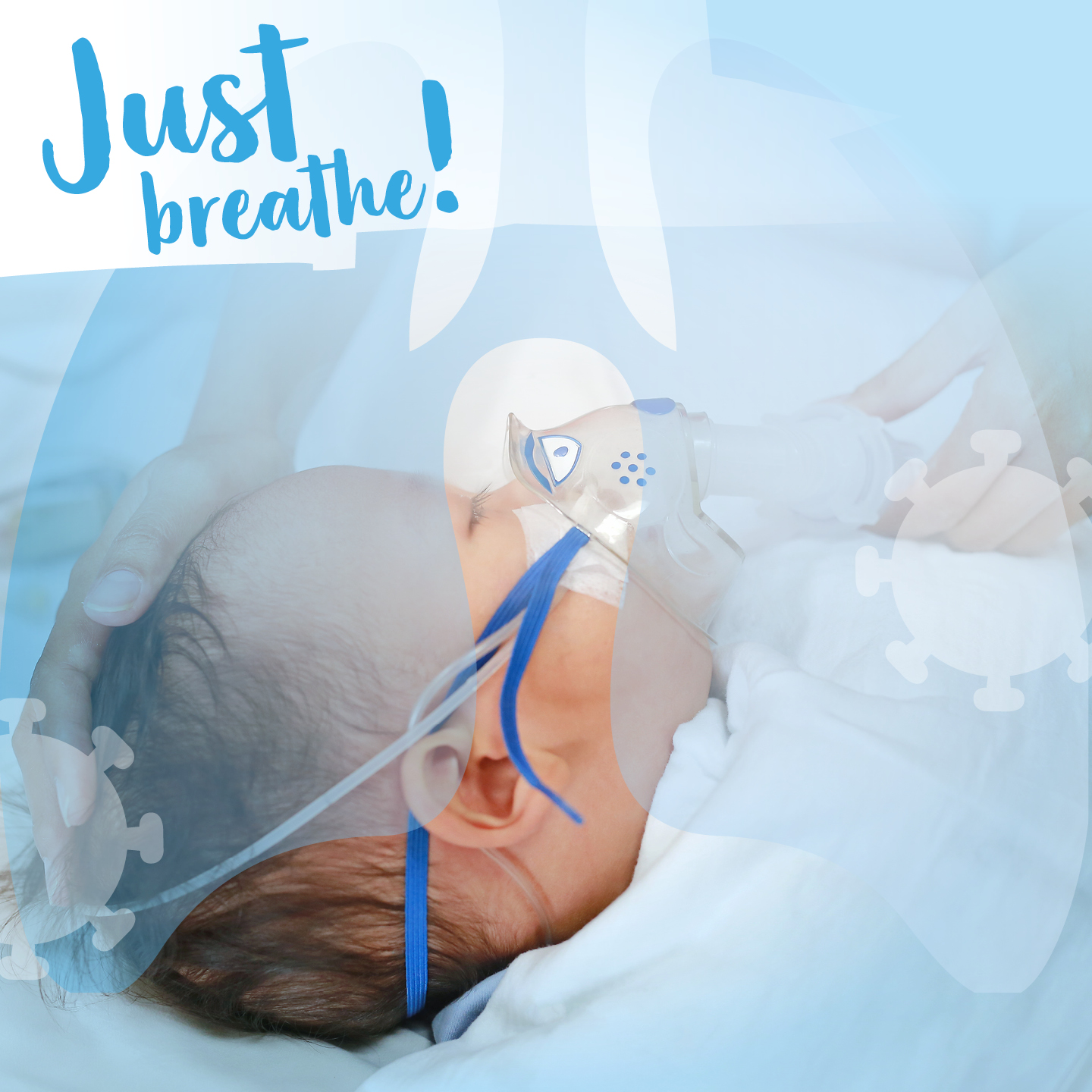
We are pleased to share the publication:
"The Multifaceted Burden of Respiratory Syncytial Virus (RSV) Infections in Young Children on the Family: A European Study"
This paper presents overall and country-specific findings on the impact of infant RSV hospitalizations on families, including:
RSV-related symptoms and parental health-related quality of life
Emotional and psychological responses to the child’s illness
Levels of health literacy and disease awareness
Experiences with healthcare communication and support structures
The publication offers a deeper understanding of how RSV affects not just the child, but the entire family unit across different healthcare systems in Europe.
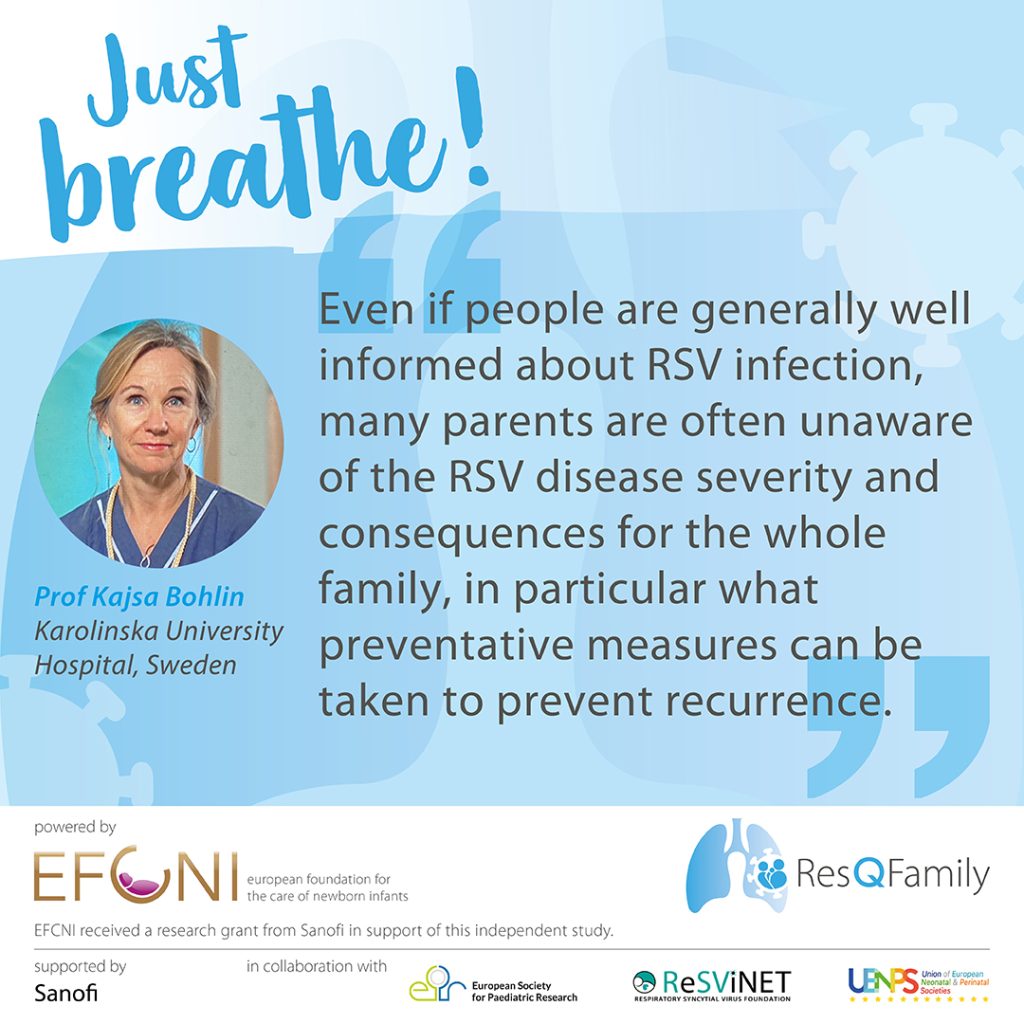
The ResQ Family Project sheds light on the far-reaching impact of severe RSV infections—not just on infants, but on the entire family. The findings reveal how hospitalizations due to RSV significantly affect parents' mental health, daily routines, and overall quality of life. The report calls for urgent action: early prevention through vaccination, strong mental health support for families, and respectful, continuous communication between healthcare professionals and parents.
Explore the full report to learn why empowering parents and preventing severe RSV from the outset must be top priorities in pediatric care.
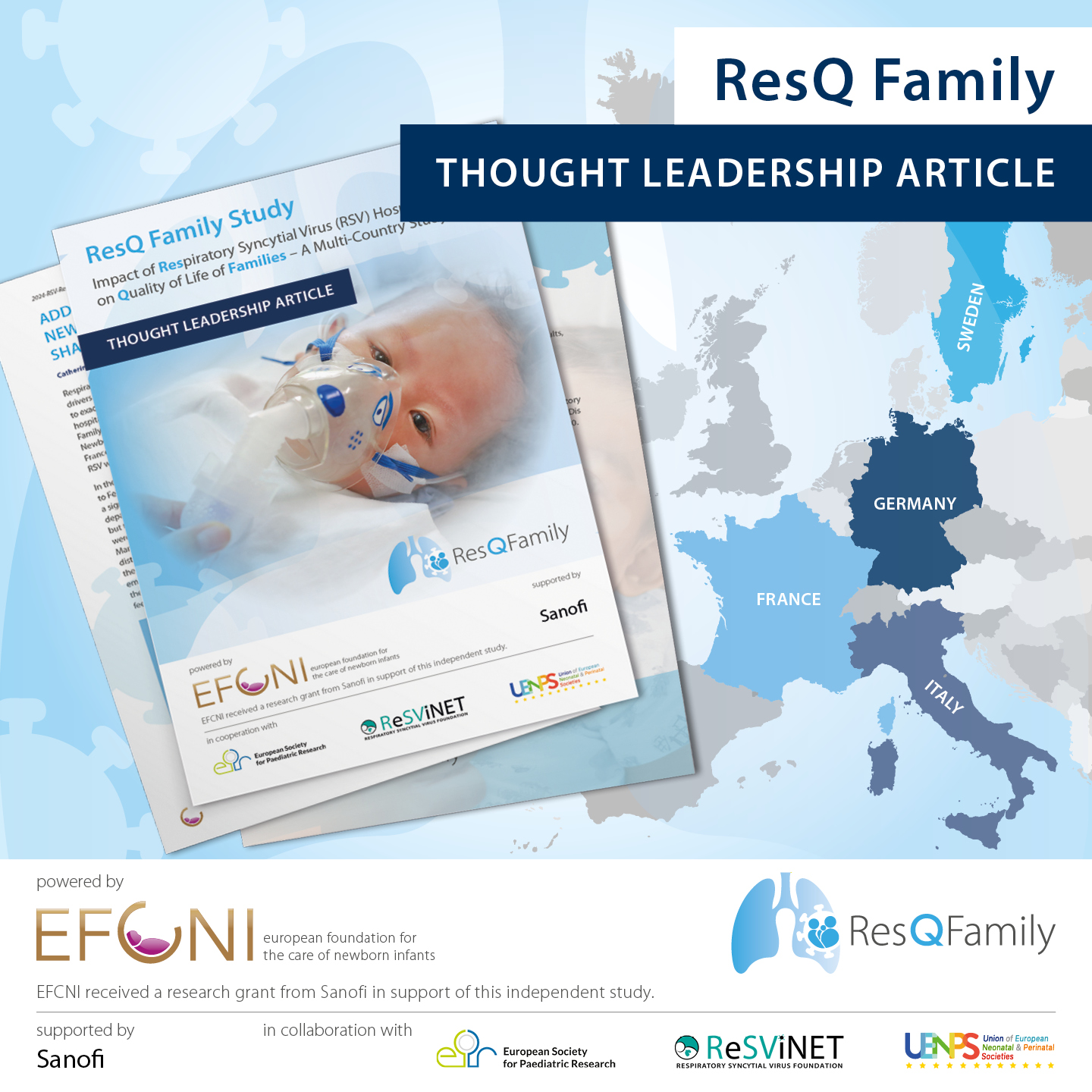
The Thought Leadership Article, co-authored by RSV expert Prof. Catherine Weil-Olivier and EFCNI’s Head of Scientific Affairs Dr. Christina Tischer, emphasizes the critical need to address the full burden of RSV-related hospitalizations of children on their families. Understanding this burden is essential for developing novel RSV prevention strategies that can significantly influence future public health initiatives in Europe.
Additionally, this article summarizes key findings from the ResQ Family study, highlighting the substantial emotional burden and negative impact on the health-related quality of life experienced by affected families.
Explore further insights into the importance of developing future RSV prevention strategies by reading our Thought Leadership Article.
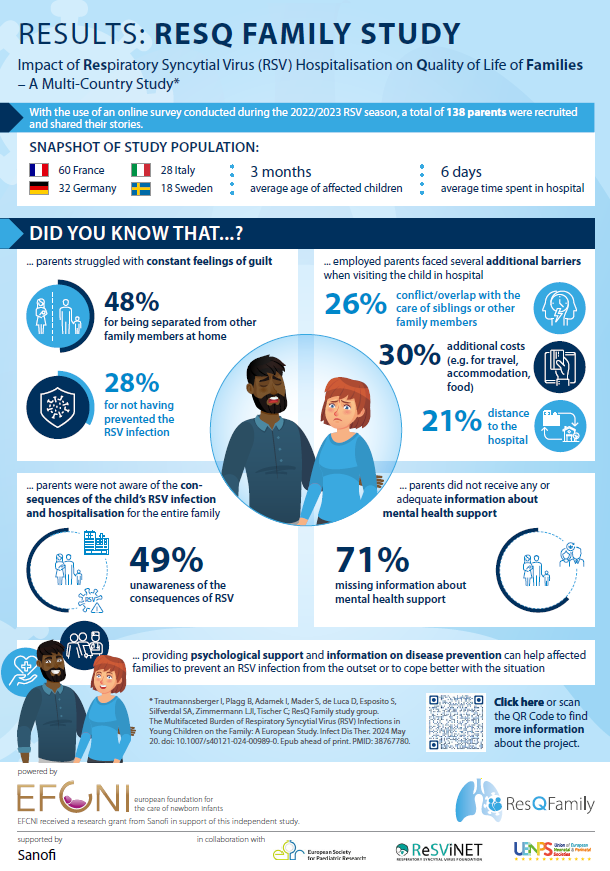
This one-pager summarizes the most important key findings from the ResQ Family study. It is designed as an effective resource for distribution at conferences or as an email attachment, aiming to capture the attention of healthcare decision-makers and clearly communicate the relevance of the topic to stakeholders and interested parties.
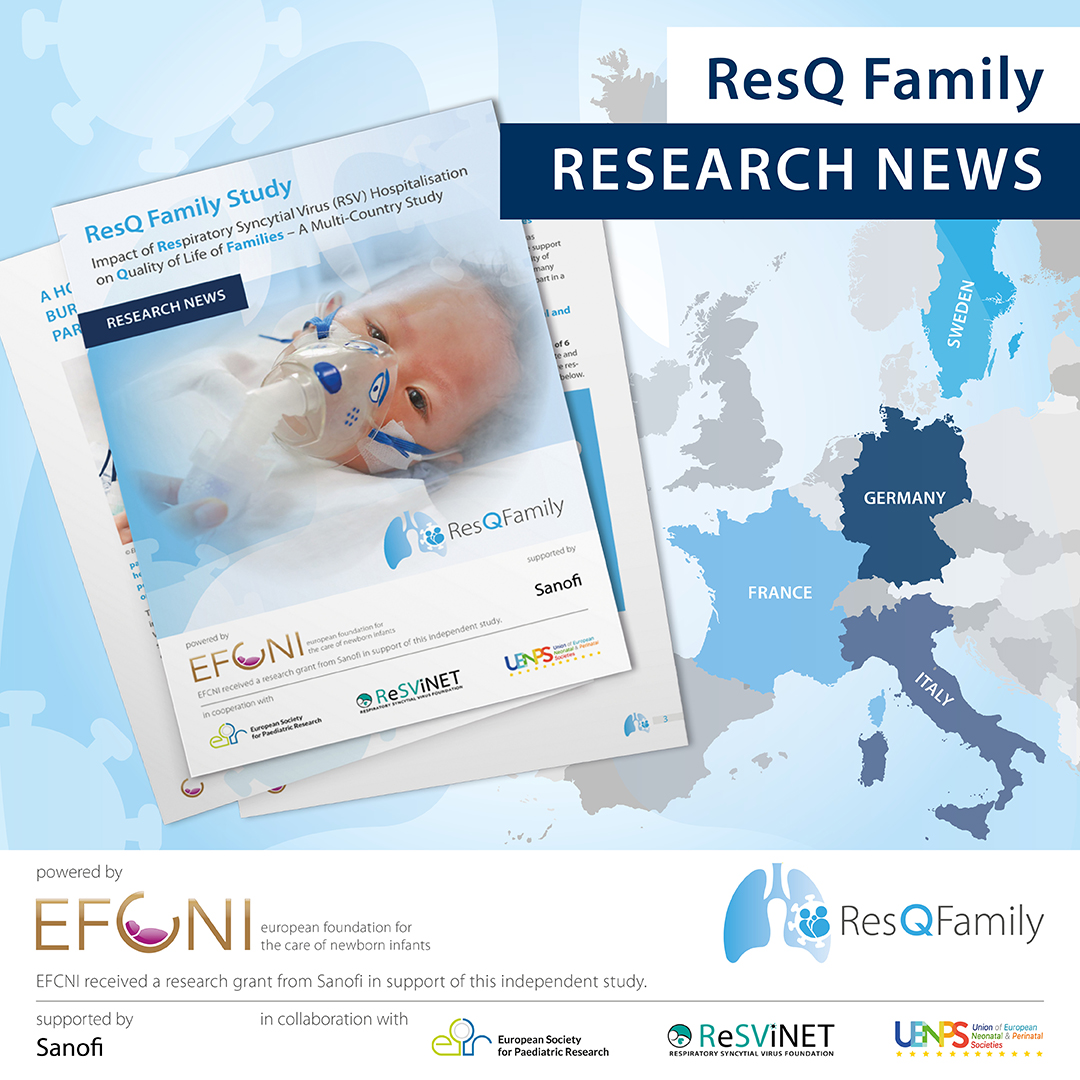
This Research News provides an overview of essential study insights, including both general and country-specific findings. It reveals how parents are impacted and identifies gaps in support for affected families within individual countries, highlighting areas that require attention and improvement in the future.
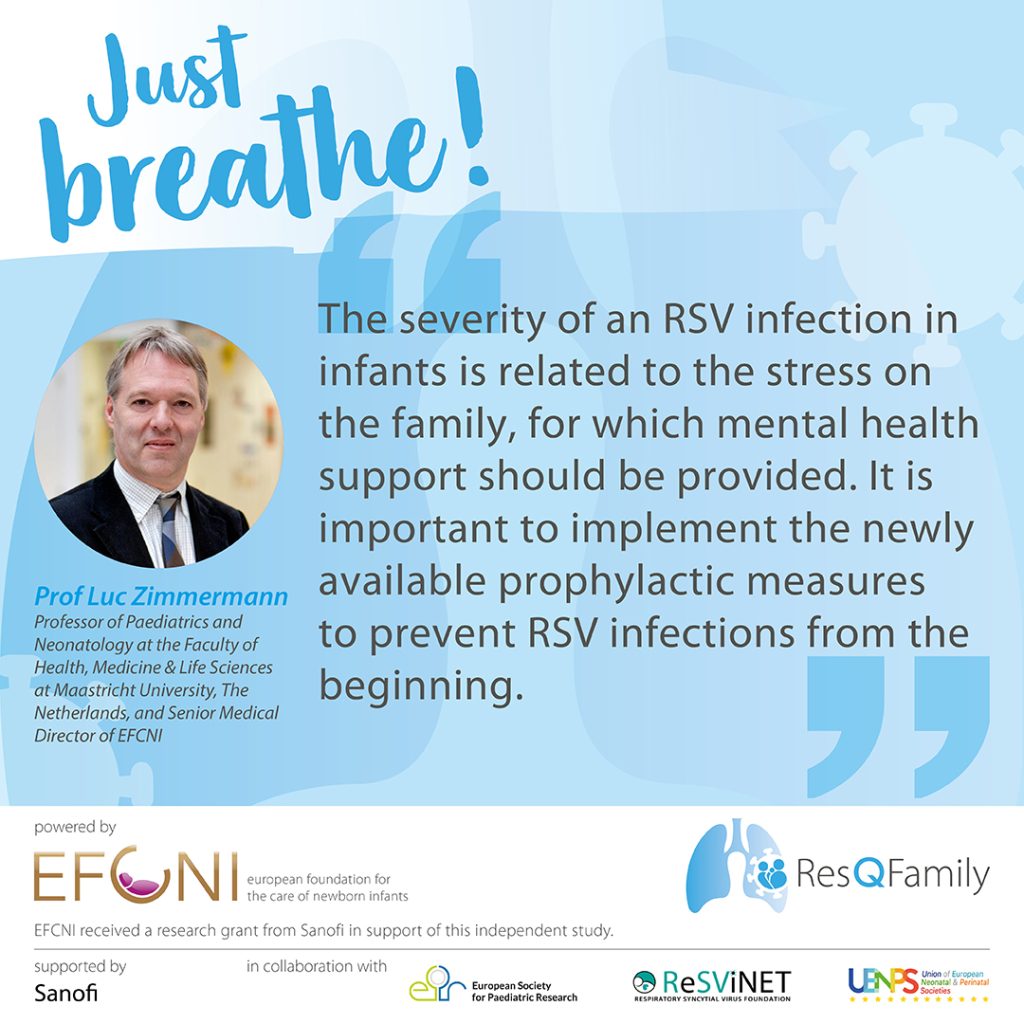
As part of the ResQ Family project, GFCNI published a press release highlighting the emotional and practical impact of RSV-related hospitalizations on families. The release underscores how a child’s hospitalization due to RSV can lead to:
Anxiety and stress for parents
Feelings of guilt
Disruption of professional responsibilities and work life
Financial strain due to travel costs and long distances to hospitals
These findings demonstrate the widespread consequences RSV can have on both children and their families, emphasizing the urgent need for prevention strategies and public awareness.
Let’s keep working together to better protect the health and well-being of infants and support the families who care for them.
Throughout the ResQ Family project, GFCNI brought together leading experts in RSV, neonatology, pediatrics, quality of life research, and parent representation to ensure the study remained grounded in science and real-world needs. These digital roundtables played a key role in shaping the study design, refining outreach strategies, and guiding dissemination efforts.
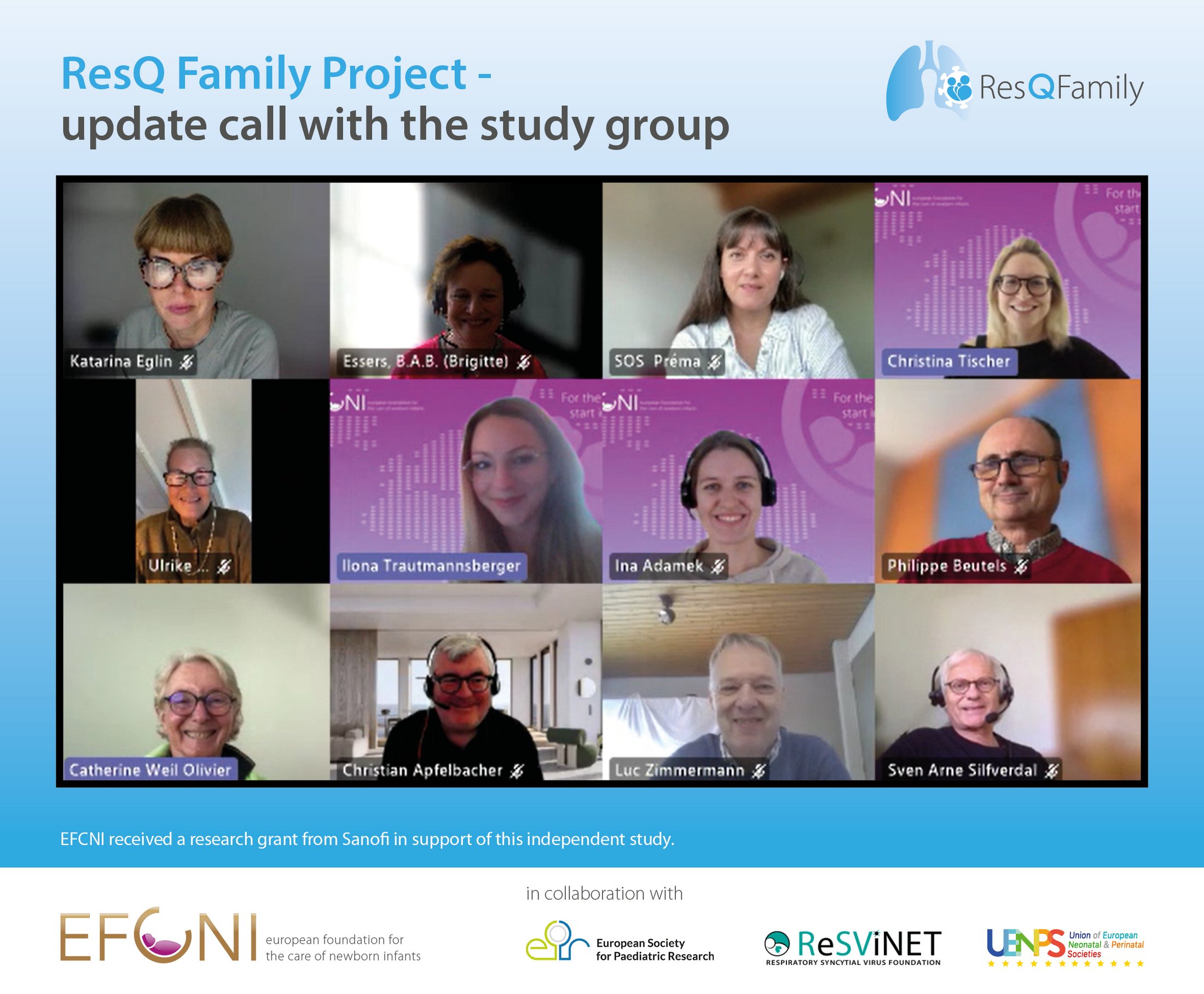
On October 23, 2024, GFCNI hosted the final expert roundtable to review the ResQ Family project’s achievements. The group:
We extend our heartfelt thanks to:
Together, we can continue working toward protecting the health of the most vulnerable and supporting families affected by RSV.
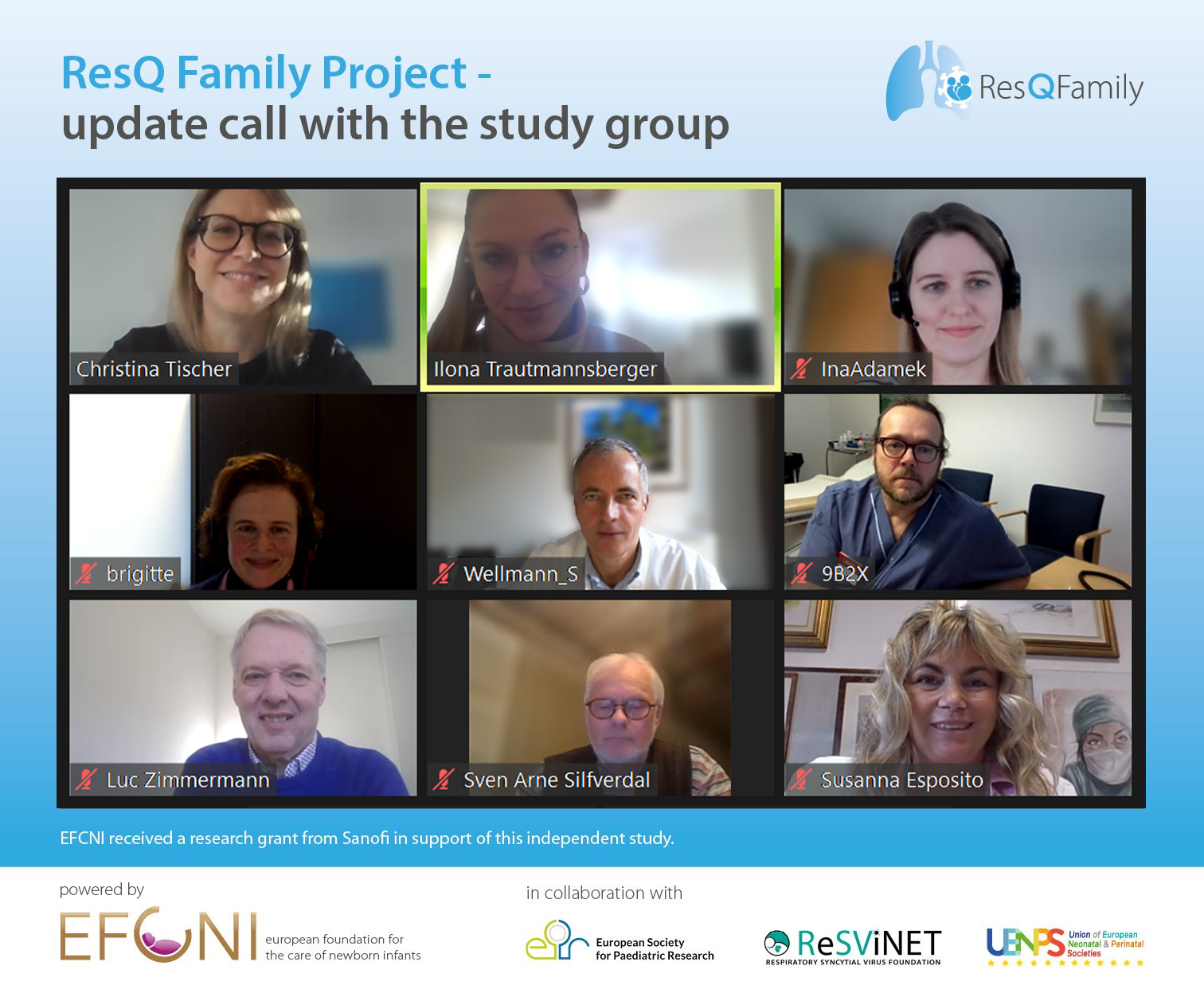
At the start of 2024, the expert group reunited to review the project’s progress and outline the next steps. Key discussion points included:
As RSV-related hospitalizations remain a challenge to healthcare systems across Europe, the team emphasized the urgent need to raise awareness and improve care for affected families.
We deeply appreciate the contributions of our experts and thank the families whose participation made this work possible.
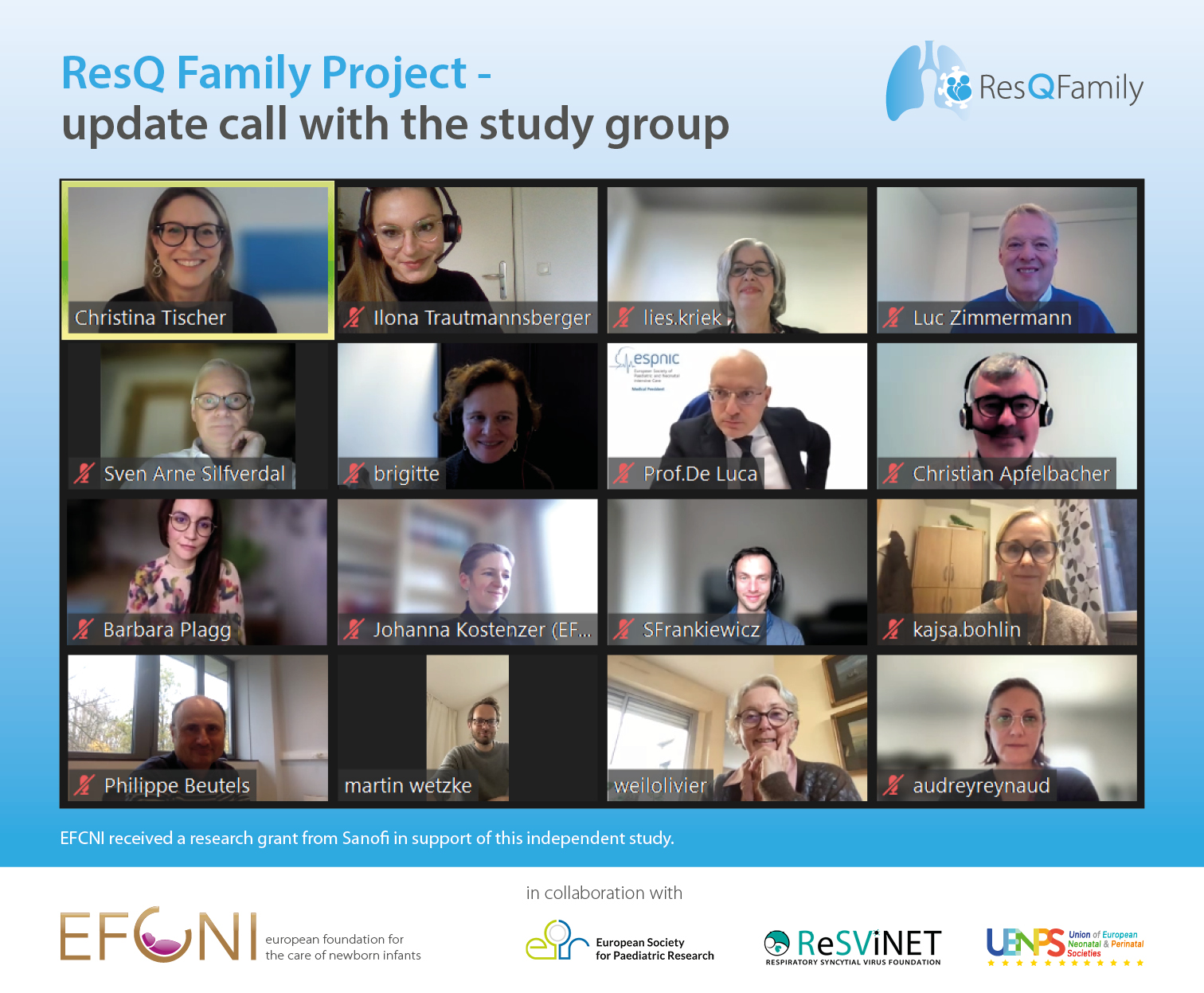
In December 2022, GFCNI convened another digital roundtable to provide an update on the project’s progress. The focus of this session was to:
Our thanks go to all contributors, and we looked forward to building momentum into 2023.
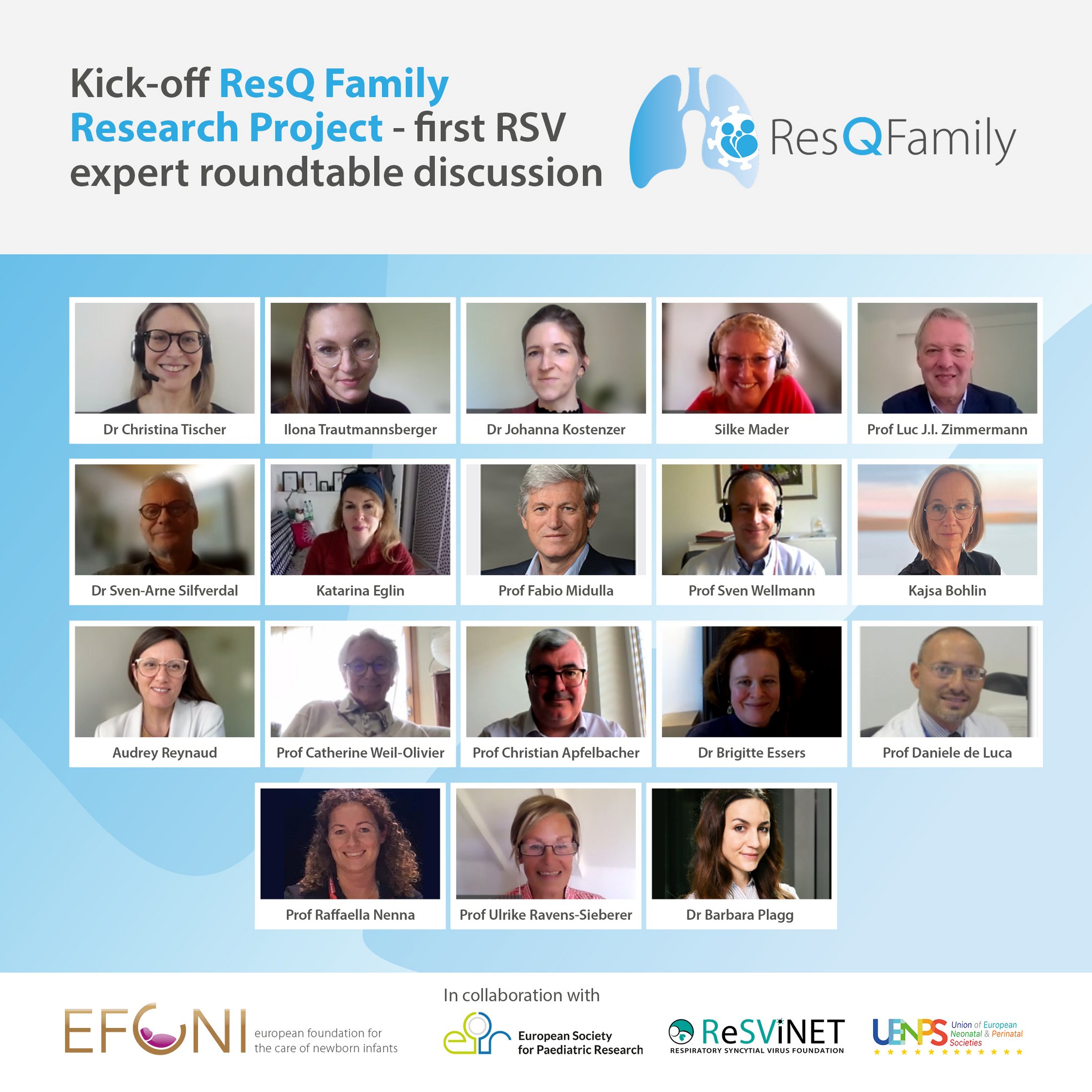
On April 28, 2022, GFCNI hosted the first digital expert roundtable for the ResQ Family project. A multidisciplinary team of specialists met online to discuss the project’s scope and methodology. The group included:
The valuable input from this session directly informed the development of the online caregiver questionnaire, designed to capture the experiences of families with infants up to 2 years old who had been hospitalized due to RSV.
We sincerely thank all experts for their insightful contributions.
Since its launch in September 2022, the ResQ Family team has actively participated in numerous national and international conferences and congresses. These events provided opportunities to:
Present the goals and methodology of the study
Share preliminary and final findings
Raise awareness of the RSV burden on families
Expand our international network of healthcare professionals, researchers, and parent advocates
Below is an overview of the key conferences where GFCNI presented insights from the ResQ Family project.
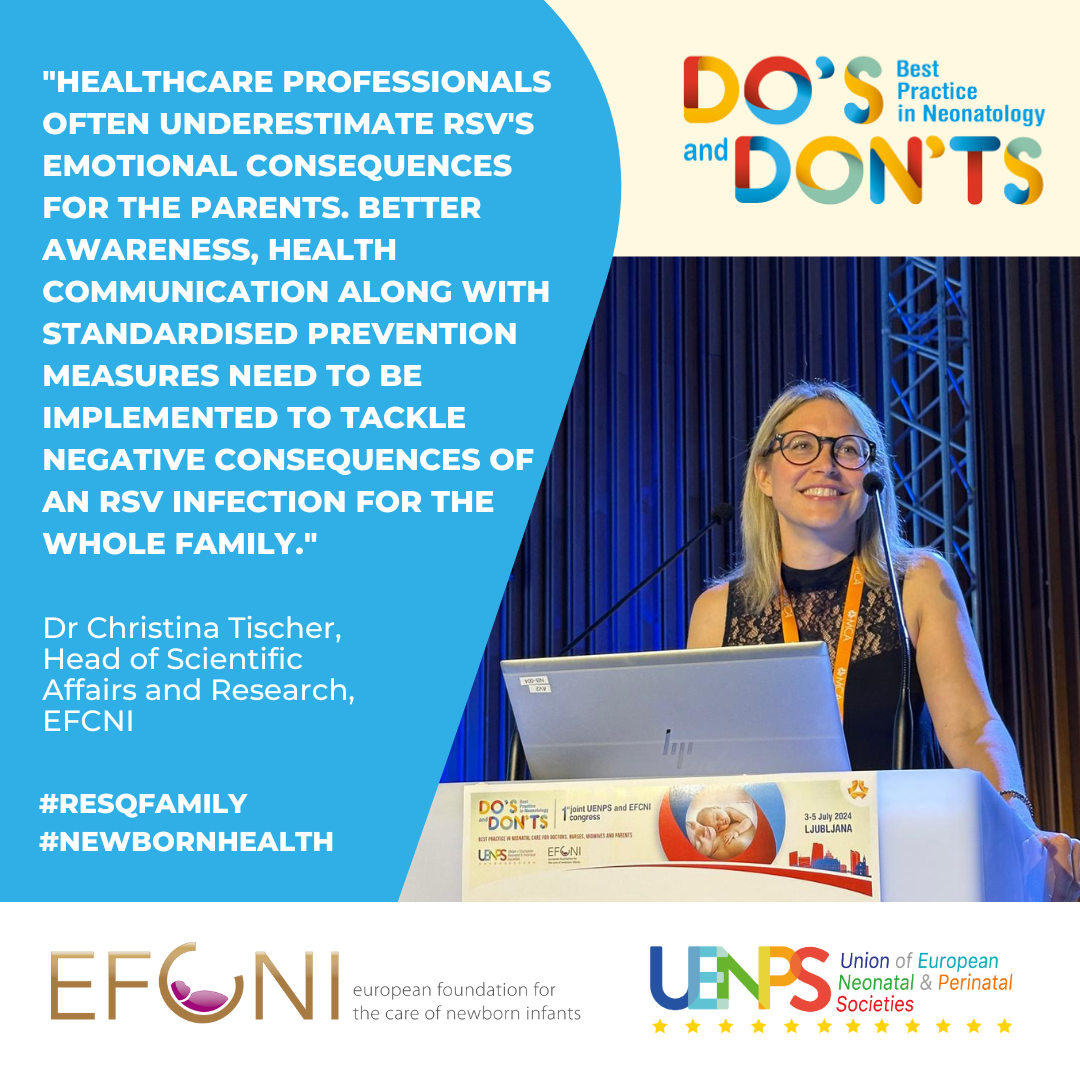
At this congress, Dr. Christina Tischer and Ilona Trautmannsberger presented compelling findings including:
The impact of RSV hospitalizations on caregiver quality of life
Over 44% of parents reported feeling often or always guilty for not preventing their child’s RSV infection
They also introduced campaign assets designed to promote RSV prevention and family support initiatives.
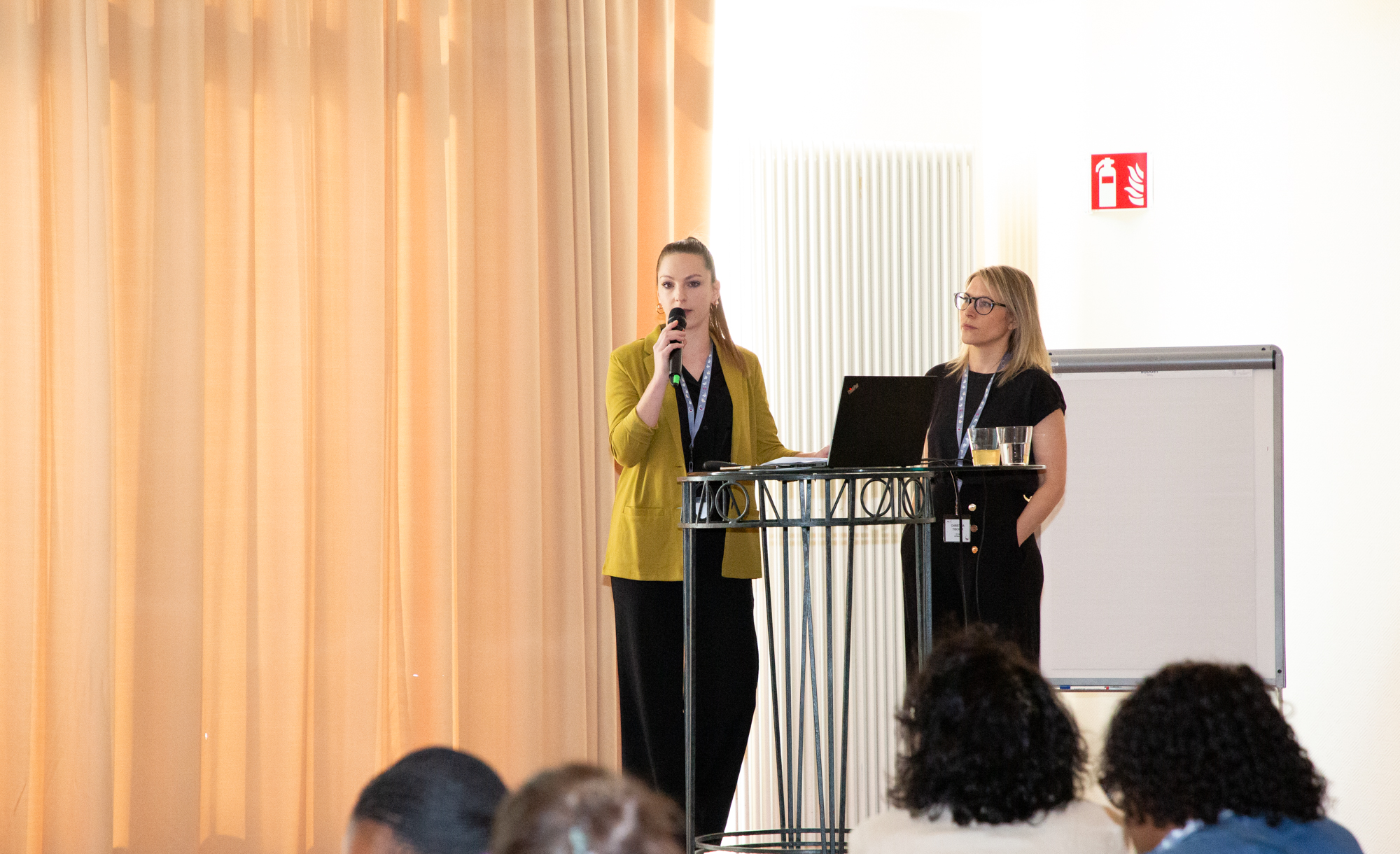
At the 2024 summit, Dr. Chistina Tischer and Ilona Trautmannsberger addressed:
They also unveiled the dissemination strategy and invited the audience to provide feedback on campaign materials for national awareness efforts.
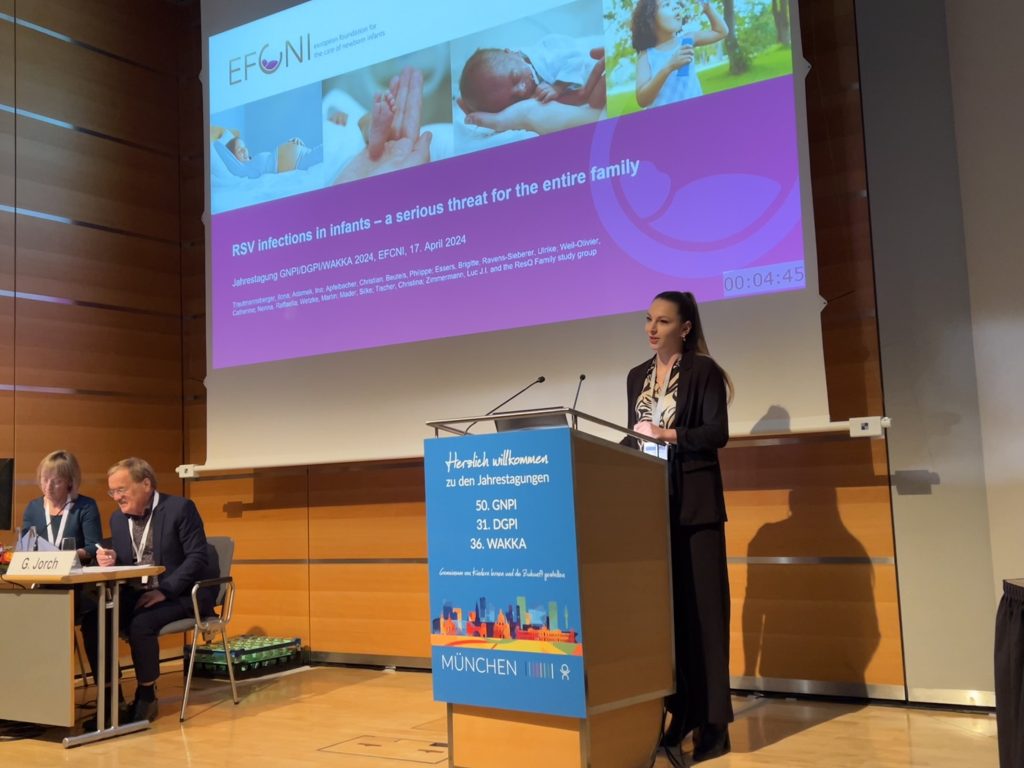
At the German Society for Neonatology and Pediatric Intensive Care (GNPI), Ilona Trautmannsberger shared official study results:
Presence and severity of RSV symptoms
Parental concerns and caregiver health over time
Significant drops in HRQoL and family functioning during hospitalization
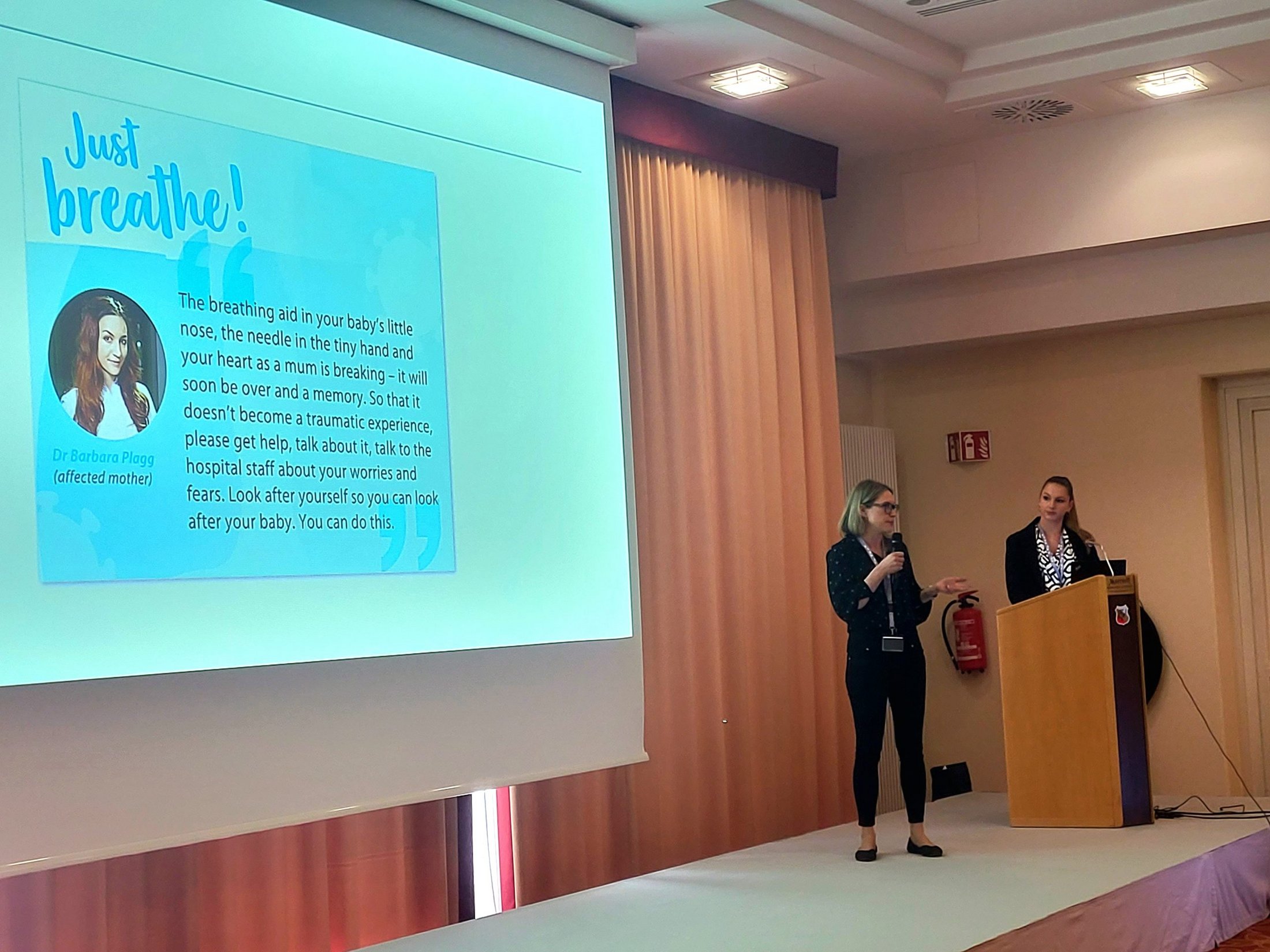
In 2023, Dr. Christina Tischer and Ilona Trautmannsberger presented preliminary study findings including:
A quote from PEG member Dr. Barbara Plagg poignantly captured the emotional toll experienced by affected families.

In May 2022, the project was introduced internally to GFCNI’s corporate partners and international network of patient and parent organizations.
Dr. Christina Tischer and Ilona Trautmannsberger emphasized the global burden of RSV in infants and the need for scientific evidence on the quality-of-life impact on affected families.
GFCNI will continue sharing the outcomes of the ResQ Family study at upcoming international congresses and conferences throughout 2025. Stay tuned for more opportunities to learn about this important research.
[1] Bianchini S et al. Role of Respiratory Syncytial Virus in Pediatric Pneumonia. Microorganisms. 2020 Dec 21;8(12):2048. doi: https://doi.org/10.3390/microorganisms8122048
[2] Díez-Gandía E et al. The impact of childhood RSV infection on children’s and parents’ quality of life: a prospective multicenter study in Spain. BMC Infect Dis. 2021 Sep 6;21(1):924. doi: https://doi.org/10.1186/s12879-021-06629-z
[3] Lapillonne A et al. Impact on parents of bronchiolitis hospitalization of full-term, preterm and congenital heart disease infants. BMC Pediatr 12, 171 (2012). doi: https://doi.org/10.1186/1471-2431-12-171
[4] Leidy NK et al. The impact of severe respiratory syncytial virus on the child, caregiver, and family during hospitalization and recovery. Pediatrics. 2005 Jun;115(6):1536-46. doi: https://doi.org/10.1542/peds.2004-1149
[5] Li Y et al. Global, regional, and national disease burden estimates of acute lower respiratory infections due to respiratory syncytial virus in children younger than 5 years in 2019: a systematic analysis. Lancet. 2022 May 28;399(10340):2047-2064. doi: https://doi.org/10.1016/S0140-6736(22)00478-0
[6] Mazur NI et al. Respiratory Syncytial Virus Network (ReSViNET). Lower respiratory tract infection caused by respiratory syncytial virus: current management and new therapeutics. Lancet Respir Med. 2015 Nov;3(11):888-900. doi: https://doi.org/10.1016/S2213-2600(15)00255-6
[7] Mazur NI et al. Respiratory syncytial virus trials and beyond. Lancet Infect Dis. 2015 Dec;15(12):1363-5. doi: https://doi.org/10.1016/S1473-3099(15)00304-7
[8] Rha B et al. Respiratory Syncytial Virus-Associated Hospitalizations Among Young Children: 2015-2016. Pediatrics. 2020 Jul;146(1):e20193611. doi: https://doi.org/10.1542/peds.2019-3611
[9] Shi T et al. RSV Global Epidemiology Network. Global, regional, and national disease burden estimates of acute lower respiratory infections due to respiratory syncytial virus in young children in 2015: a systematic review and modelling study. Lancet. 2017 Sep 2;390(10098):946-958. doi: https://doi.org/10.1016/S0140-6736(17)30938-8
[10] Varni JW et al. The PedsQL Family Impact Module: preliminary reliability and validity. Health Qual Life Outcomes. 2004 Sep 27;2:55. doi: https://doi.org/10.1186/1477-7525-2-55
[11] Wang X et al. Respiratory Syncytial Virus-Associated Hospital Admissions and Bed Days in Children <5 Years of Age in 7 European Countries. The Journal of infectious diseases. 2022. doi: https://doi.org/10.1093/infdis/jiab560
[12] Zhang S et al. Cost of Respiratory Syncytial Virus-Associated Acute Lower Respiratory Infection Management in Young Children at the Regional and Global Level: A Systematic Review and Meta-Analysis. The Journal of infectious diseases. 2020. doi: https://doi.org/10.1093/infdis/jiz683
GFCNI received a research grant from Sanofi in support of this independent study. All content was independently developed and verified by GFCNI and its scientific advisors.

© 2025 GFCNI. All Rights Reserved.